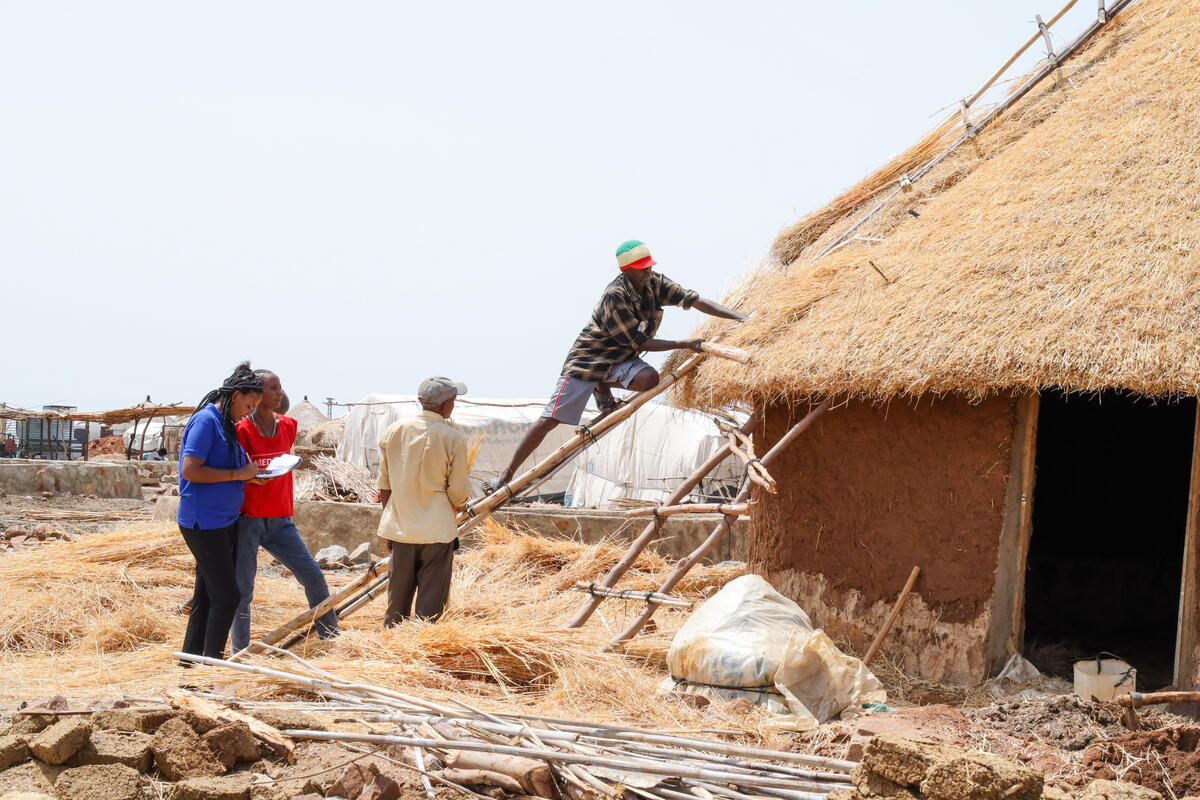First phase of Timor emergency airlift complete, tents reach Dili displaced
First phase of Timor emergency airlift complete, tents reach Dili displaced

DILI, Timor-Leste, June 9 (UNHCR) - UNHCR's emergency response team on Friday began distributing tents and blankets to some of the most crowded camps in the Timor-Leste capital Dili, where people have fled violence, looting and arson attacks over the past five weeks.
The first 1,000 tents are on the ground in Dili, part of some 56 tonnes of supplies delivered in the first phase of UNHCR's airlift to Timor-Leste. This was completed on Friday with the arrival of a third Antonov-12 flight from the northern Australian city of Darwin.
The flights ferried tents, blankets, plastic sheeting and jerry cans, which were picked up earlier in the week from UNHCR's regional stockpile in Jordan and flown to Australia aboard two Boeing 747s. A further 150 tonnes of aid is due to arrive from Darwin by barge on Monday, which will mean there is enough immediate aid for some 17,000 people.
UNHCR plans to send 400 tonnes of supplies in phases, but needs more donor help. "We urgently need funding of some US$4.8 million for our operation to help tens of thousands of displaced people in Timor-Leste. So far funds have been slow in arriving, with only $286,000 from Australia, $185,000 from private donors in Australia, and 50,000 Euros from the Government of Germany," the refugee agency's chief spokesman Ron Redmond told reporters in Geneva on Friday. "We hope with the launch of the UN Flash Appeal shortly that donors will give generously," he added.
UNHCR on Friday distributed 98 tents to four sites, including camps at Dili's Comoro Airport, Don Bosco College and the Canossian Sisters Convent, Balide. Forty tents were also given to the National Hospital for staff whose houses have been torched.
Under the supervision of veteran UNHCR site planner, Ghassem Fardanesh, land was cleared to pitch the tents at Don Bosco College and the airport. Fardanesh also showed camp representatives and organisers how to erect the tents.
Edio da Costa, elected humanitarian coordinator at the airport camp, welcomed the arrival of the tents and said they would go a long way to ease congestion and improve conditions at the site. People fleeing instability in Dili have been arriving at the site since the end of April and more than 4,800 displaced people have been registered there.
The strong foreign troop presence at the airport reassures them, but there is little in the way of shelter or other facilities. "There is a lack of food, shelter and tents and I'm very concerned about the health risk. My two daughters have begun coughing over the past few days," da Costa said.
Da Costa arrived at the camp in late May when a wave of arson and looting swept his neighbourhood. "Many groups are out to loot homes. We are scared they will take all our belongings," said the civil servant, who has organised two dozen volunteers to register arrivals and do other jobs around the camp.
One of those volunteers, Hernnio Godinho, helped put up the first tent. "These tents will give people some privacy and protection, and shield them from the weather," said Godinho.
The lightweight, tunnel tents were designed by Fardanesh and first used in Aceh after the tsunami of December 2004. They are waterproof, have a built-in floor and mosquito netting, and will comfortably hold a family of 5-7 people.
"The current plan is to place the tents in U-shaped groups, with services like water, latrines and garbage disposal in the immediate vicinity for each community," Fardanesh said. "The doors will open around a common area, with a private area at the back for people to cook, wash and store firewood.
Emergency supplies are also being distributed to churches, which host some of the largest populations of displaced people. On Friday, 10 tents and 1,500 blankets were delivered to a convent run by the Canossian Sisters. More than 8,000 people have been formally registered at the site, but convent head Sister Guilhermina Marcal said the number swells to up to 13,000 at night.

Overcrowding and lack of sanitation are the biggest concerns. UNHCR emergency staff visited the site on Friday to try and determine urgent needs and to decide on the best places to pitch the tents.
For Sister Marcal, however, security remains a concern. "We never know what is going to happen. Before, we knew who is the enemy, but now we have no idea," she said. "We have about 35 men who help provide security, but more or less every night people are trying to come into the compound," she added, while calling on the Australian military to send troops to protect the camp.
By Ariane Rummery in Dili, Timor-Leste








